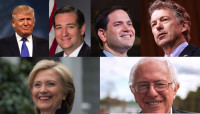The 2016 Bitcoin Voting Guide
source: Bitcoin News
2016. Jan. 30. 14:00

The 2016 U.S. Presidential campaign season is in full swing, and both major parties – the Democrats and the Republicans – will soon be voting for the next president. Where do the major candidates stand with regard to Bitcoin? Which candidates are most likely to encourage the growth of Bitcoin, and which candidates will do the most to try to hinder it?
See also: Enemies Of The Sharing Economy
Bitcoin.com does not endorse any political candidates. The opinions expressed in this article belong entirely to the author.
Voting Guide
Before we look at the major candidates, let’s remember that discussion of Bitcoin has not appeared explicitly on the campaign trail. We must gather each candidate’s position based on his or her views regarding related issues – government regulations, the Fed, bank bailouts and debt. Information on the candidates was gathered from their respective websites, as well as OnTheIssues.org.
Republicans
Donald Trump As is true with most of his positions (other than immigration), it is hard to know where Trump would stand on Bitcoin. On the positive side, he appears to be pro-business and open to new business opportunities such as Bitcoin. However, he also shows no aversion to debt spending, and like most the candidates, is not shy about using the State to advance his agenda. He also once suggested that we try to “close up” parts of the Internet in order to stop the rise of Islamic terrorism.
Ted Cruz On the campaign trail and in his background, Cruz has generally supported smaller government and fewer regulations. Furthermore, he is a strong proponent of the free market. However, his wife works for Goldman Sachs, and his ties to Wall Street suggest that he could be beholden to their interests.
Marco Rubio Interestingly, on Marco Rubio’s donation page, you must acknowledge that “I am making this contribution using my own personal credit or debit card, PayPal account, or Bitcoins, and not those of any business entity.” However, there is no way to actually donate using Bitcoin. Rubio is pretty much the caricature of an establishment Republican, which usually means that he promotes the “free market” but isn’t shy about using the power of the State when he feels it necessary. On the other hand, he has called for the elimination of the capital gains tax, which, as the law is currently written, would eliminate taxes on gains from Bitcoin.
Rand Paul Rand Paul is the first, and still only, major presidential candidate to accept Bitcoin donations. Prior to this, he admitted to being “fascinated by the concept” of Bitcoin. He is also generally against government intervention in the free market, and describes his views as “libertarianish.” He is the only candidate to be openly skeptical of the Federal Reserve, calling on the government to audit the secretive institution and claiming that it devalues government-issued currency. Paul has also been one of the few politicians to oppose open-ended surveillance by the NSA and other government agencies. Of all the major candidates, he appears the most receptive to Bitcoin and cryptocurrencies.
Democrats
Hillary Clinton It would be hard to imagine a worse candidate than Hillary Clinton when it comes to Bitcoin. She is pro-regulation, supports bank bailouts, and wants to grow the size and scope of government. She is opposed to the “sharing economy” and is supportive of a massive Surveillance State.
Bernie Sanders Bernie Sanders appears at times as the best and the worst candidate when it comes to Bitcoin. On the one hand, he is against the bank bailouts that have occurred in recent years, and he is also very antagonistic to Wall Street and crony capitalism. On the other hand, Sanders looks to the government as the solution to almost all problems, and is an avid supporter of government regulations in almost every area of life.
Nothing has been said on the campaign trail about Bitcoin, and it is unlikely that cryptocurrencies weigh heavily on the candidates’ minds this election cycle. But with regulations such as the New York BitLicense affecting the use of Bitcoin on that state, the next President could have a significant impact on the mainstream acceptance of Bitcoin in the coming four years.
What do you think? Which candidates are best suited to support the growth of Bitcoin? Or does it matter?
Images courtesy of respective campaign websites, Uber, and Wikimedia Commons.
The post The 2016 Bitcoin Voting Guide appeared first on Bitcoin News.





